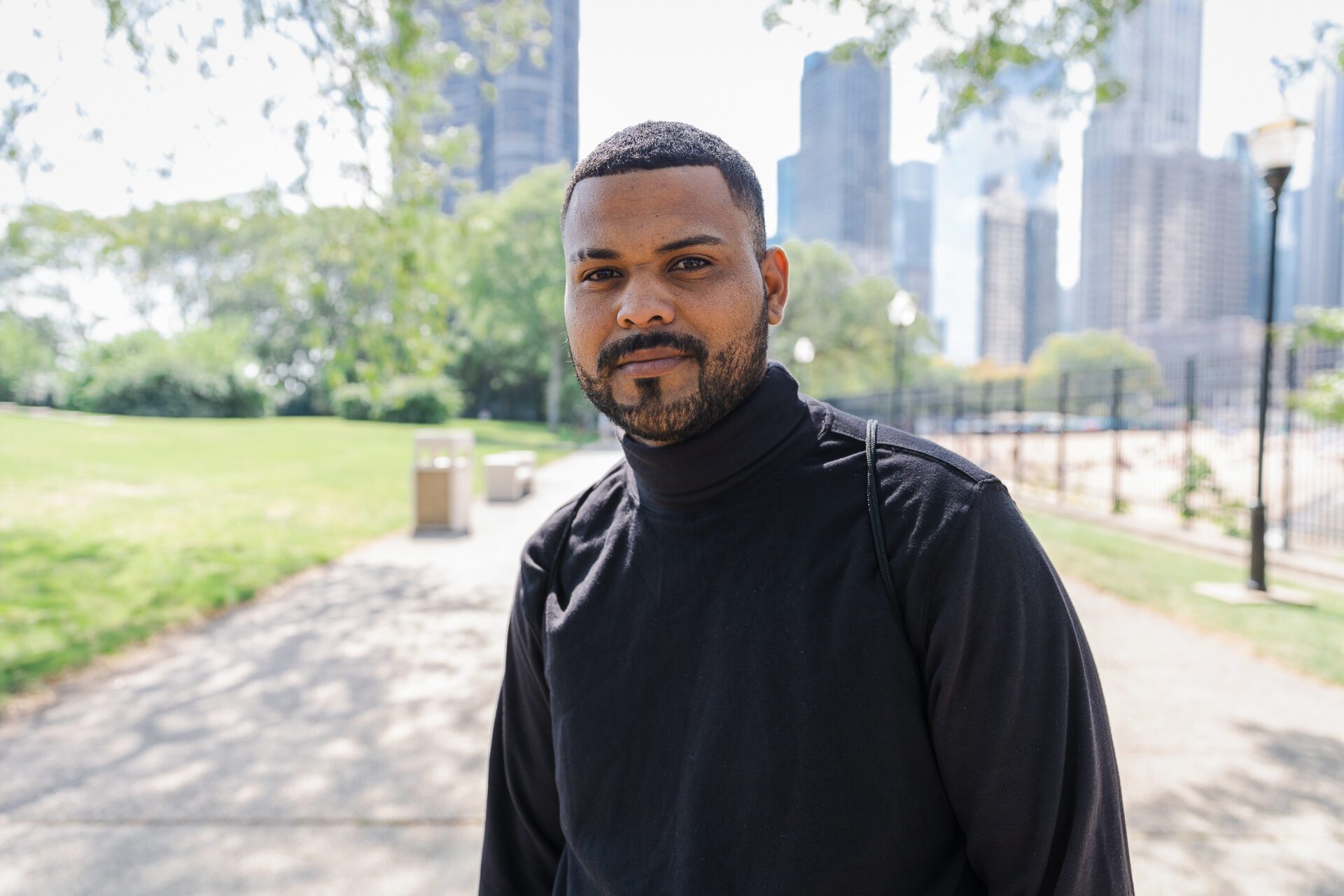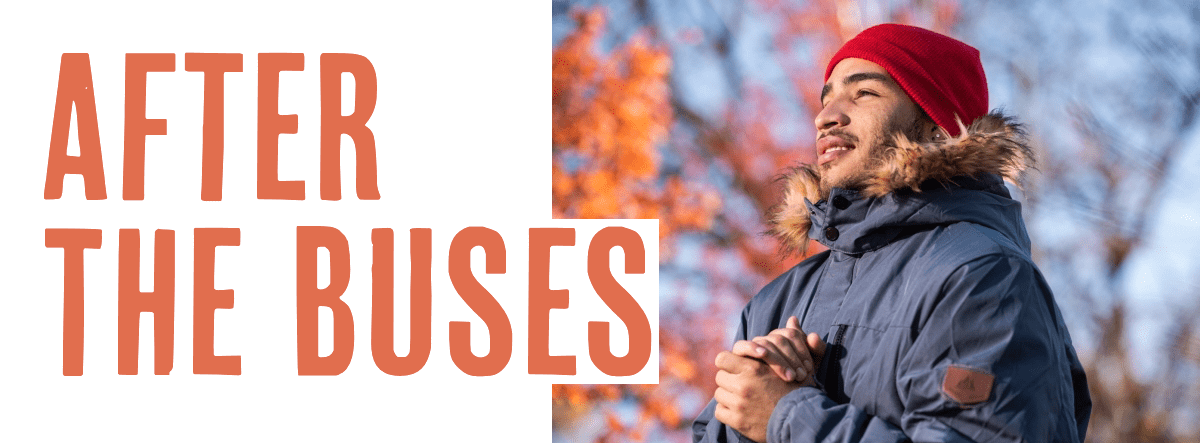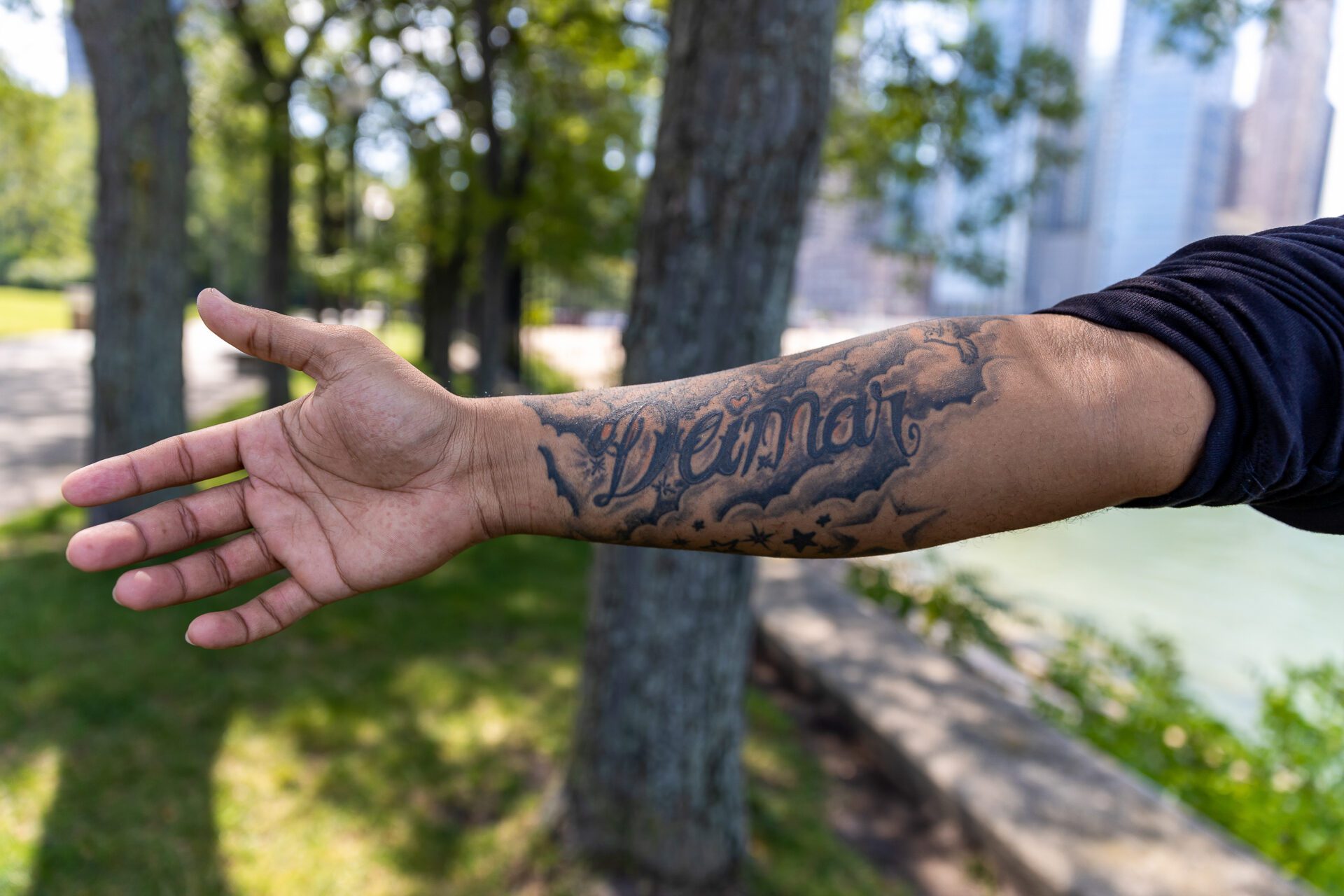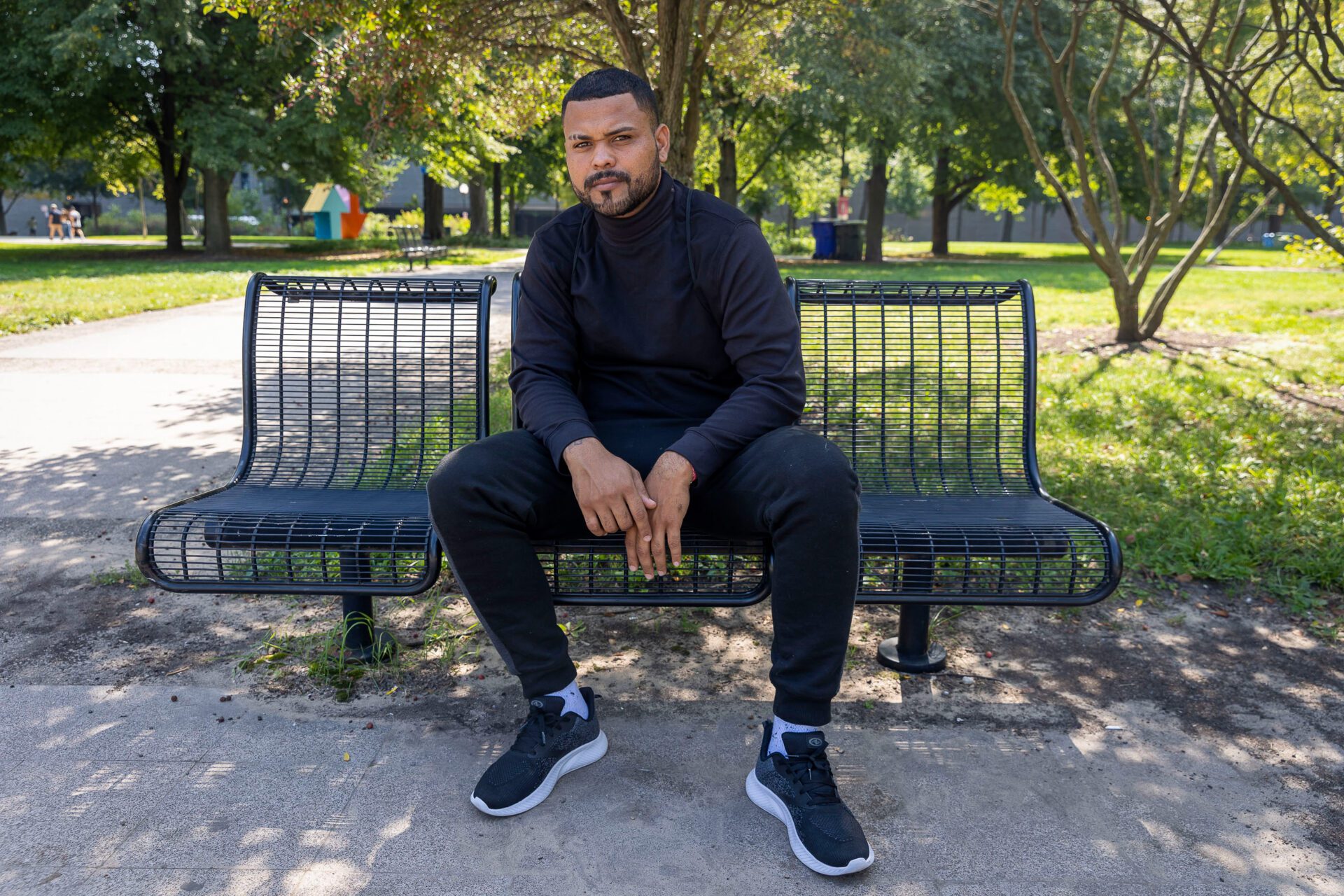 Jesus J. Montero para Borderless Magazine
Jesus J. Montero para Borderless MagazineDenis "Omar" Covis viajó más de 5.000 kilómetros para encontrar un trabajo que mantuviera a su mujer embarazada y a sus hijos.

Desde un refugio del West Side de Chicago, Denis "Omar" Covis esperaba nervioso el nacimiento de su hija en Venezuela este otoño. A casi cinco mil kilómetros de distancia, este joven de 26 años veía en su teléfono cosas como los baby showers y el primer día de colegio de sus hijos. Dice que estar lejos de sus hijos y de su mujer embarazada no fue su elección. Era una necesidad.
Covis llegó a Chicago en septiembre, trasladado en autobús contra su voluntad desde Texas tras abandonar Venezuela. Hizo el viaje principalmente a pie, atravesando el sol abrasador, grandes altitudes, condiciones gélidas, ríos poco profundos, selvas peligrosas y montañas escarpadas.
Noticias que ponen el poder en el punto de mira y a las comunidades en el centro.
Suscríbase a nuestro boletín gratuito y reciba actualizaciones dos veces por semana.
Como muchos otros, abandonó su hogar en busca de una vida mejor.
Desde 2014, más de 7 millones de venezolanos han huido de su país a países cercanos de América Latina y el Caribe. Espoleados por la violencia y la escasez de medicinas y alimentos, un número cada vez mayor de venezolanos ha llegado también a Estados Unidos en los últimos dos años.
Covis dice que vino a Estados Unidos para mantener a su mujer embarazada, a sus tres hijos y a sus padres. En su país, Covis no podía cubrir las necesidades básicas de su familia y espera que aquí haya mejores oportunidades de trabajo.
Covis explicó a Borderless Magazine por qué tuvo que abandonar Venezuela y qué espera conseguir ahora que está en Chicago.
Nací en el estado de Falcón, en Venezuela. Es una zona costera llena de playas. Fui a la escuela, pero sólo pude terminar la primaria. Tuve que empezar a trabajar muy joven para mantener a mi familia. Tengo 26 años y sigo trabajando para mantenerlos.
Durante mi infancia, recibí algunas ayudas del gobierno a través de una beca de boxeo. Pero cuando el gobierno venezolano empezó a derrumbarse, se retiraron todos los fondos que se destinaban al deporte.
Tuve a mi primogénito con mi primera mujer cuando tenía 18 años. Me encantaba mi familia.

Por desgracia, mi primera hija falleció cuando sólo tenía tres años. Estaba enferma. Tenía una enfermedad y no podía permitirme cubrir sus necesidades médicas. Tengo su nombre tatuado en el brazo. Es un recordatorio para no olvidar nunca. La relación con mi primera esposa no duró tras la muerte de mi primogénito. Así que regresé a Venezuela.
En Venezuela trabajaba de cocinero los fines de semana para mantener a mis padres. Allí conocí a mi actual esposa. Llevamos siete años juntos y estamos a punto de tener nuestro tercer hijo. Vine aquí para proporcionarles un futuro mejor, con la esperanza de encontrar trabajo haciendo cualquier cosa. Hace poco encontré trabajo en la construcción. Haré lo que haga falta en este país para traer a mi familia y cuidar de ellos.
Al principio, me llevé a mi mujer y a mis hijos a Ecuador. Tenía un amigo allí en Ecuador que me ofreció un trabajo. No estaba bien pagado y el trabajo prometido no duró mucho. Pudimos sobrevivir, pero vivir en Ecuador seguía siendo muy duro. Mis hijos me gritaban que querían cosas que yo no podía darles. O lloraban por no tener qué comer. Era difícil encontrar trabajo, tener ingresos y pagar el alquiler.
Estaba cansada de no poder mantenerlos. Así que cuando me enteré de la Brecha de Darién y cómo los venezolanos estaban cruzando a los EE.UU., decidí ir también. Tardé tres meses.
Seguir leyendo
Tomé un autobús desde Ecuador hasta la frontera con Colombia, otro autobús hasta Medellín y un tercer autobús hasta Necoclí, un lugar que lleva a otra isla, Capurgana, Colombia.
Conocí a una madre en la selva de Perú que viajaba sola con su hija de diez años. Llevaba a la hija sobre los hombros y los brazos una y otra vez durante más de tres días. La llevé hasta Panamá.
Hay muchas montañas y ríos en Panamá. Vayas donde vayas, hay muchas montañas y ríos. Fueron días difíciles.
Atravesando los ríos de Perú, la niña de 10 años lloraba y lloraba en mis brazos. El río estaba alto y la corriente iba rápida. Incluso nos caímos juntos con ella en brazos. Recuerdo que me golpeé con fuerza contra el suelo del río, pero me aseguré de que no se hiciera daño.
Cuando llegamos a Panamá, no tenía más dinero, así que empecé a caminar. Caminamos por la selva de Panamá durante tres días. Seguimos a nuestro coyote y a otros grupos en este viaje.
En mi grupo había 60 personas de Haití, la República Dominicana y Cuba. Sólo 59 personas llegaron al centro de refugiados. Una persona murió en la selva. Murió mientras subíamos una montaña. Vi que le entró el pánico y le dio un ataque al corazón. Lo vi todo. Sabía que tenía que seguir adelante y salir de allí.
No quería morir. Tengo hijos. Sólo podía pensar en mis hijos.

Sobrevivir a pie en la selva era lo más difícil.
Comí mucha comida enlatada. Pero hubo un día en que caminé tanto que ya no podía moverme porque estaba agotada. La comida me pesaba, tenía que comer lo que podía y dejar el resto.
Al final pasé hambre, me morí de hambre durante dos días. Bebí agua del río y al final, cuando salí de Panamá, me dolía el estómago porque el agua estaba sucia. No volví a ver a la madre ni a su hija a las que ayudé a atravesar los ríos y las montañas después de salir de Panamá.
Para entonces tenía los pies tan hinchados que cuando me sentaba no podía levantarme después. Cuando hacía calor, no podía andar. Cuando hacía frío, me dolían hasta los huesos.
Al llegar a México nos detuvo la policía de inmigración. Cuando nos soltaron, seguimos caminando durante dos noches y dos días seguidos. Luego me volvieron a detener durante ocho días. Querían devolverme a Guatemala. Me quitaron todo lo que llevaba encima. Pensé que mi viaje había terminado. Tuve que cruzar ríos para atravesar México. Nadé mientras los funcionarios de inmigración me perseguían. Doy gracias a Dios por haber podido llegar hasta aquí con vida después de cruzar Río Bravo.
Finalmente, pude llegar a Texas, donde las autoridades de inmigración me detuvieron una vez más durante dos días. Luego me soltaron con un permiso temporal para poder quedarme allí. Pedí ir a Nueva York, pero me metieron en un autobús a Chicago, y aquí me quedé.
Mi viaje a Estados Unidos me llevó por nueve países diferentes. Doy gracias a Dios todos los días por haberlo conseguido.
La fe es lo último que se pierde y sé que Dios nos da muchas oportunidades. Mientras viva, perseveraré.
Desde que Covis habló por primera vez con Borderless, su hija nació con complicaciones. Está trabajando para ayudar a pagar la cirugía de su esposa, que permanece en Venezuela.
Este reportaje se ha realizado con el apoyo del Fundación Chicago Headline Club.

